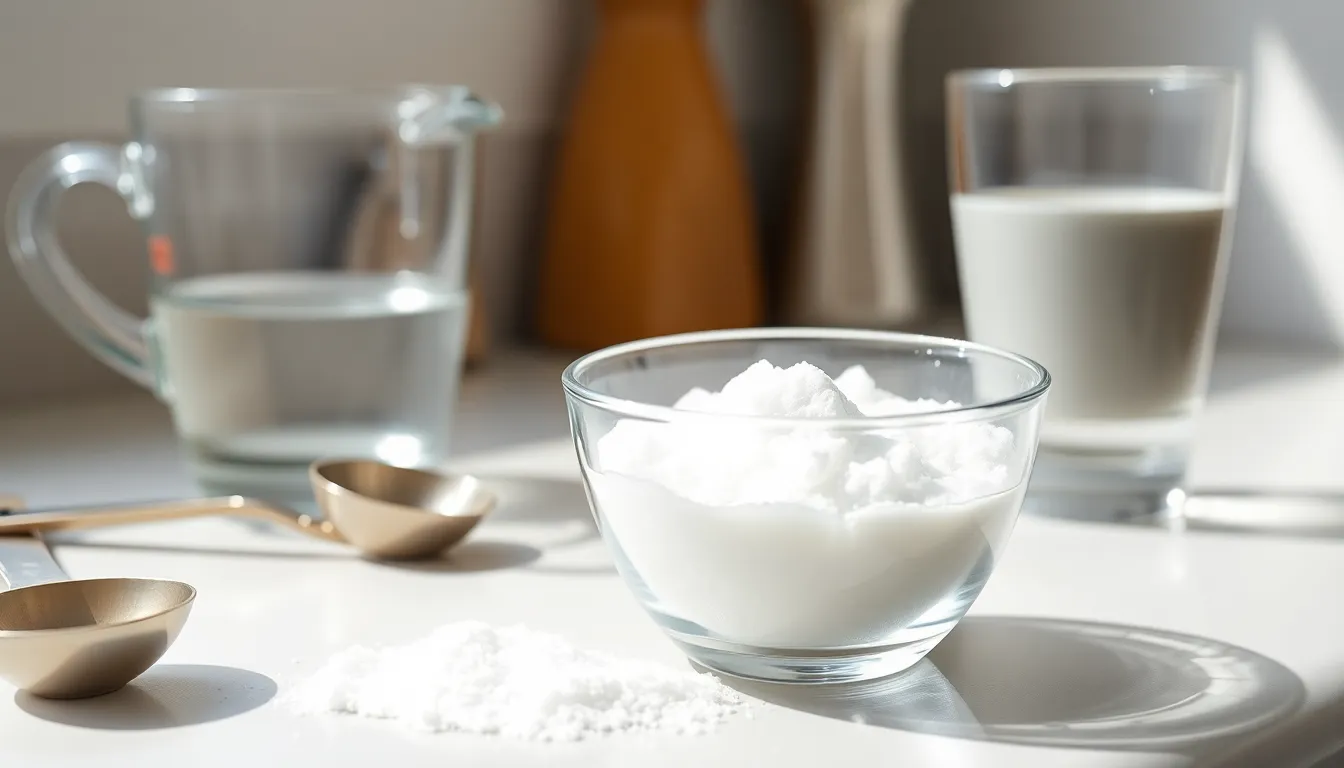Table of Contents
ToggleHeartburn can feel like a dragon breathing fire in your chest, leaving you desperate for relief. Enter baking soda, the kitchen hero that’s ready to save the day. This common pantry staple isn’t just for cookies and cleaning; it’s a powerful remedy against that burning sensation. But how much of this magical powder should one use to tame the flames?
Understanding Heartburn
Heartburn occurs when stomach acid flows back into the esophagus, causing a burning sensation. This condition stems from various factors, including diet, obesity, and certain medical issues. Diet plays a significant role; foods like spicy dishes, citrus fruits, and chocolate can trigger symptoms.
It affects numerous individuals, with approximately 20% of adults in the United States experiencing heartburn weekly. Understanding the symptoms helps identify when heartburn occurs. Common signs include a burning feeling in the chest, a sour taste in the mouth, and difficulty swallowing.
Managing heartburn often involves lifestyle adjustments. Eating smaller meals, avoiding late-night snacking, and elevating the head during sleep can reduce occurrences. Additionally, some find relief with over-the-counter remedies like baking soda.
Baking soda, or sodium bicarbonate, neutralizes stomach acid due to its alkaline properties. An effective ratio often stated is one teaspoon of baking soda dissolved in a glass of water.
It’s essential to use this remedy sparingly. Frequent use may lead to side effects such as gas or bloating. Consulting a healthcare professional before trying baking soda for relief is advisable, especially for those with chronic conditions. By understanding the nature of heartburn and its triggers, individuals can make informed choices about management options.
What Is Baking Soda?

Baking soda, also known as sodium bicarbonate, is a white crystalline powder. Commonly used in baking, it serves as a leavening agent, helping dough rise.
Properties of Baking Soda
Baking soda possesses alkaline properties. It has a pH level around 9, making it effective in neutralizing acids. This substance is soluble in water, creating a bicarbonate solution that reacts with acids. In addition to culinary uses, baking soda also acts as a mild abrasive and deodorizer, making it useful for cleaning. Many people keep it in their kitchens and bathrooms due to its versatility.
How Baking Soda Works for Heartburn
Baking soda alleviates heartburn by neutralizing stomach acid. When ingested, it combines with excess acid, forming carbonic acid. This reaction reduces the acidity in the stomach, providing symptomatic relief. A teaspoon of baking soda dissolved in water can quickly soothe discomfort. Users often find that it provides temporary relief from symptoms. Despite its effectiveness, it’s essential to avoid overuse, as it may lead to gas or bloating.
Recommended Dosage
Baking soda can provide temporary relief for heartburn when used correctly. It’s crucial to adhere to suggested dosages for safety and effectiveness.
General Guidelines
For adults, one teaspoon of baking soda mixed with 8 ounces of water typically offers sufficient relief. This dosage should not exceed seven times a week. Frequent use increases the risk of side effects, including gas and bloating. Immediately stop taking baking soda if symptoms persist and consult a healthcare professional.
Individual Considerations
Individuals with specific conditions, such as hypertension or kidney disease, should approach baking soda with caution. Consulting a healthcare provider becomes critical for people on sodium-restricted diets. Pregnant individuals should also seek medical advice before using baking soda to avoid complications. Ensuring personal health circumstances receive adequate attention optimizes safety while using this remedy.
Risks and Side Effects
Baking soda can help relieve heartburn, but it comes with risks and side effects. Understanding these potential issues is crucial for safe use.
Potential Health Concerns
Excessive consumption may lead to metabolic alkalosis, a condition that results in a higher pH in the blood, causing muscle twitching, hand tremors, and nausea. Some individuals may also experience increased gas or bloating as a result of carbon dioxide production during the reaction with stomach acid. Rarely, high sodium levels from baking soda can elevate blood pressure or worsen heart problems for those with existing conditions. Regular monitoring of symptoms is advisable for anyone using baking soda frequently for heartburn relief.
When to Avoid Baking Soda
People with certain medical conditions should steer clear of baking soda. Those with hypertension must consider its sodium content before use. Individuals with kidney disease also face risks since their bodies struggle to balance sodium levels. Pregnant women should consult healthcare providers prior to using baking soda to ensure safety for both mother and baby. If experiencing severe or frequent heartburn, professional advice is essential for proper diagnosis and treatment rather than self-medicating with baking soda.
Alternative Remedies for Heartburn
Ginger serves as a popular natural remedy for heartburn. It contains compounds like gingerol that may help soothe the stomach lining and reduce acid production. Consuming ginger tea or chewing raw ginger can provide relief.
Apple cider vinegar might offer another option. Diluting one to two tablespoons of apple cider vinegar in water before meals may balance stomach acidity for some individuals. However, caution is necessary, as it can trigger symptoms in others.
Aloe vera juice is known for its soothing properties. Drinking about a quarter cup of aloe vera juice before meals may help reduce inflammation in the esophagus. Selecting an aloe vera product labeled as safe for ingestion is essential.
Licorice root, available in various herbal forms, can support a healthy stomach lining. Chewable licorice supplements can help, but individuals must select deglycyrrhizinated licorice to avoid potential side effects associated with licorice root extract.
Chamomile tea presents another calming option. Sipping chamomile tea in the evening may help minimize stress and promote better digestion, likely reducing heartburn symptoms.
Marshmallow root also acts as a soothing agent for the gastrointestinal tract. Using marshmallow root tea or supplements may help coat and protect the lining of the esophagus.
While exploring alternative remedies, individuals must also consider trigger foods. Keeping a food diary can help identify specific foods that may exacerbate heartburn. Additionally, practicing mindful eating habits can enhance digestion and minimize discomfort.
For persistent symptoms, consulting a healthcare provider remains crucial. Identifying the underlying causes of heartburn can lead to more effective and long-term management strategies.
Baking soda can be a quick and effective remedy for heartburn when used correctly. Its ability to neutralize stomach acid offers relief to many experiencing discomfort. However, moderation is key to avoid potential side effects. Those with specific health conditions should always consult a healthcare professional before incorporating baking soda into their routine.
Exploring alternative remedies and making lifestyle changes can further enhance digestive health. Keeping track of food triggers and practicing mindful eating will empower individuals to manage their heartburn more effectively. Ultimately, understanding one’s body and seeking professional guidance will lead to better long-term solutions for heartburn relief.




